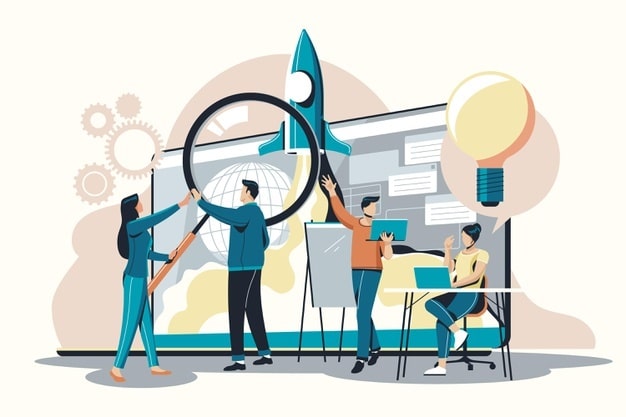Over the years, the Customer Relationship Management System has evolved beyond a simple contact management tool. We have moved further to a new decade where the key trends have taken new turns to accelerate the growth of the industry. Indeed, it is at the forefront of innovation! The competitive software system offers the best-in-class customer experience. Moreover, the redefined CRM strategies and solutions pose the catalyst to capture its unique demand in the marketplace!
But, in which direction is the CRM software heading? And how do the companies make the most of the software system? The growing market, powerful features, and tech integration have had a wider impact on CRM trends.
Surprising CRM Trends That Will Blow Your Mind
- The CRM industry is expected to reach $80 billion in revenue by the end of 2025.
- 91% of organizations with more than ten employees have integrated CRM systems to boost operational efficiency and communication.
- According to a report by Forbes, the sales team invest only 18% of their time in developing CRM strategy – the foundation program for sales.
- Around 82% of successful companies use CRM software for sales reporting.
- Top marketers believe CRM systems can improve sales by 29%.
You see, if growth is your ultimate objective, then CRM software is not a choice anymore! Rather, it should be your primary goal to improve your business opportunities.
Have a look at where the CRM system is heading in the coming years!
Top 10 CRM Trends of 2025
1. Customer Experience
Customer experience has become a major priority for businesses in 2022. In fact, 86% of buyers are willing to pay extra for a seamless customer experience. CRM technology can help in providing a personalized customer experience that results in higher engagement and long-term retention.
In simple words, people prefer to visit a place where they are treated well. So, organizations need to deliver a better customer experience than what their competitors are offering! It is to draw new prospects and boost ROI. Nowadays, CRM platforms are doing much better with their robust performance. In fact, your customer service team can host tools, boost their marketing efforts and empower CX.
Industry experts suggest that two exceptional drivers, firstly convenience and then competition, can exceptionally improve customer experience. In addition, while considering customer experience, they must focus on personalization. Particularly after the pandemic, individualized experience calls more attention from your valued customers. It gives companies the opportunities to convert loyal customers to brand ambassadors and gain a positive reputation through word-of-mouth marketing.
2. Artificial Intelligence
The possibilities are endless if you take the most benefits of AI. In other words, AI is not only here; the way your CRM succeeds widely depends on it. Moreover, if you want to focus on a personalized experience for customers, you have to pay attention to AI.
Automation:
Without machine learning automation, an effective project management system and customer handling are quite impossible. The biggest benefit of AI is that it cuts down the monotonous and lengthy process of customer segmentation! In order to understand the specific needs of the customers, it is very important to generate their profiles. An automated CRM system can help users analyze customer data effectively and tweak marketing campaigns on the basis of specific variables, thus enhancing personalization.
Communication Tools:
The incredible conversational tools like chatbots and voice assistants can improve your business value. Chatbots can help to improve service efforts by keeping communication channels open and clearing real-time doubts or customer queries. On the other hand, NLP (Natural Language Programing) features play a pivotal role in managing customer service:
- It helps to determine the customer’s request and understand its highest priority
- Classify the most urgent and important queries and respond to them ASAP
- Understand customers’ sentiments from their emails and messages
- AI is also great at recording voice meetings & developing transcripts by understanding the topics of each business genre
Analytics:
The benefits of AI in CRM software don’t end here! The predictive analytics capabilities are crucial to mitigate potential business challenges. Also, it improves business outcomes by sensing the data storage! In addition, as AI can identify the user’s behaviors, it can enhance sales opportunities. These analytics help marketing experts to make their dynamic decisions. Moreover, the real-time insights also help create customer preferences and trigger buying decisions.
3. Business Mobility
The expansion of the CRM system has already broken the shackles of office boundaries. Mobility is the most crucial component of sales activity. With the improvement of processes, the workforce has become scattered. The buyers’ demand has increased so far that it poses many challenges to the sales reps. This, in turn, increases the demand for CRM. All these components work together to define a roadmap of success.
On the other hand, the pandemic has also emphasized the requirement of enterprise mobility. The distributed workforce needs to be controlled under a disciplined software system. So that it scales up operational efficiency and helps to manage remote projects more effectively; also, it ensures better accessibility from anyplace and anytime. To manage a team successfully, businesses utilize the power of team communication software and other chatbots.
While considering business mobility in CRM software, what are the things to consider?
- Robust security features
- Intuitive interface
- Multi-platform application
- A redefined work eco-system available in both online and offline mode
The post-pandemic world has made the introduction of the CRM system evident. Business across the marketplace has adopted the software and established comprehensive distributed teams.
4. Data Reliance
The need for data unity is crucial for today’s businesses. This is why marketers prefer to leverage their growth policy with prominent data management tools. Analytics is one of the important keys to success, and marketing executives believe in developing their campaigns with effective analytics-based reports.
Indeed managing data is crucial for every business. Whether you have ten employee strengths or a hundred, CRM efforts are great for managing data. Also, this strategy helps to boost business reports. With predictive analysis and relevant data channels, businesses are likely to be more connected with their workforce. Apart from being a successful project management software, CRM helps to gather potential data and modify dynamic channels.
Be it user engagement or customer relations, the potentially relevant data are the prominent tools. With a structural format, the software can help make a smart business decision.
5. Social CRM is in the Trend
Social CRM refers to social media channel integration in the CRM platform. If social media and CRM systems are integrated, they can do wonders! These two powerful tools can help together in acquiring brand sentiment. If an organization installs a social CRM system, it will effectively boost engagement and strengthen customer relationships.
In this case, you can also include potential feedback from your loyal customers to redefine the roadmap. The main advantage of social CRM is that it provides a 360-degree view of what your customers are saying about your organization and builds high visibility.
6. The Age of Digitalization
We are already in a digital age! And customer experience has risen to a new height mitigating all the bars. Social media is the primary focus of the new age. The most recent response has started to emerge since covid19. From grocery shopping to food ordering, all businesses have moved online. An AI-enabled CRM can help organizations sift through vast volumes of data, personalize online experiences, and master marketing campaigns.
Indeed, digital platforms greatly impact safety, agility, and convenience. There’s no doubt that consumer interaction has increased with the rise of digital transformation companies and new software trends. On the other hand, companies can connect with their audience in real-time and strengthen brand equity. It also suggests the idea of one-to-one marketing. That is quite impossible without the introduction of a CRM system.
So, it is not surprising why marketing leaders are adopting CRM! Likewise, social advertising and publishing are also fundamental to reaching your targeted audience. While social media platforms have so much to offer, traditional channels like email are still alive. In fact, it is a great way to connect with customers. The flexibility of the channels and system integration is the winning part of the system.
In a world where the empowerment of customers is the top-most priority, digital transformation in the CRM system has a crucial role.
7. Integration
While this might also refer to technologies and channels, the sales expert emphasizes internal activities. They suggest opting for a solution that helps integrate other software systems as well. They focus on having a solution that the team members feel flexible to handle. From marketing automation to service tools, it must have the capacity to integrate with customer data platforms.
Integration is revolutionizing the entire marketing industry! Similarly, the Internet of Things (IoT) also has substantial capabilities. And it is expected to connect 41 billion customers by 2027. This advantage will lead to more data in the software for better insight and strategic marketing effort.
Apart from that, this will enable the marketing experts to pull data from other business channels. Tools like Zapier can help operate the system using data import capabilities, APIs, and SDKs.
IoT will have a tremendous impact on how customer relationship management tools work. IoT-enabled devices can use real-time data feeds to analyze trends and insights on customer behavior to devise personalized marketing campaigns.
If you improve customer experience by integrating IoT, it is likely to boost enterprise capabilities and cost-efficiency. Moreover, the IoT technology helps monitor clients’ efficiency in proactive ways that were completely unimaginable a few years ago!
8. Channel-less CRM
This is relatively new in terms of its application. Channel-less CRM offers potential opportunities to move forward CRM users and vendors. It shows how to streamline business activities in a customer-centric atmosphere. It is an omnichannel approach to create a suitable business environment to leverage full-service reps.
However, to implement the structure, one needs to build technology enabling customer experience that is channel less. It also refers to one single software that can handle multiple channels and centralize the communications. These multiple communication lines don’t focus on a specific channel.
9. Usability
Marketing expert Dozer explained this as the Renaissance of Simplicity. Addressing the expectations of the coming years, Dozer explained the change in the business system and CRM software. The effective utilization of the applications can aid the customer service reps to adopt a better approach towards the customers. Negating the cumbersome information of the customer data, they can easily track their activities.
In other words, Dozer was trying to focus on CRM usability in end-users. Gone are the days of non-technical users and their operational strategies. In this new age, marketing experts need to adopt intuitive capabilities. CRM systems can help businesses operate efficiently with real-time business intelligence and ensure a solution for a next-level experience.
10. Market Movement
The explosion of CRM is well-documented. In addition, it is the central part of a business stack. The industry growth has introduced many changes at the vendor level and also consolidated the offerings. Many companies are transforming their ways with notable changes in the CRM software solution. Even though the business landscape seemed very crowded, the introduction of CRM can draw major changes in the business.
If you prioritize growth, no matter what your business perspective is, CRM is indeed a great option. Sales expert Dozer evaluates that the CRM developers need to address the specific requirement of the product. If a business runs with 10 reps, the customer service department should expand its efficiency by integrating a strong software system.
Therefore, it is crucial to distinguish the difference among the business requirements. So, the solution can address the exact objective of the business! A more sophisticated approach should be taken to automate reporting, customization, email marketing, and enabling central databases. In that case, companies should focus on:
- Providing quick support with live chat
- Unifying data sources to track the customer journey and support tickets
- Automating knowledge bases
- Syncing customers with applications
If your CRM technology can offer the expectation of today’s customers, it can easily boost engagement and operational efficiency.
So, What Next?
Well, the trends are like an ocean breeze. They are continuously evolving! Market leaders are always active in adopting new changes and new systems. One needs to be in a better position to sail towards success. While considering that the CRM trends are a smart choice to stay ahead of the competitors, it is also crucial to accommodate the new wave of development.
CRM is not about your customer-facing team! Unfortunately, the traditional thought process has evolved over the years. Marketers now understand the pipelines and monitor the entire system with this efficient software.
For that matter, effective tracking and faster decisions can help you in the long run. If you are planning to upgrade your existing software system, it will help you reach the potential height you have been looking for!
FREE. All Features. FOREVER!
Try our Forever FREE account with all premium features!






